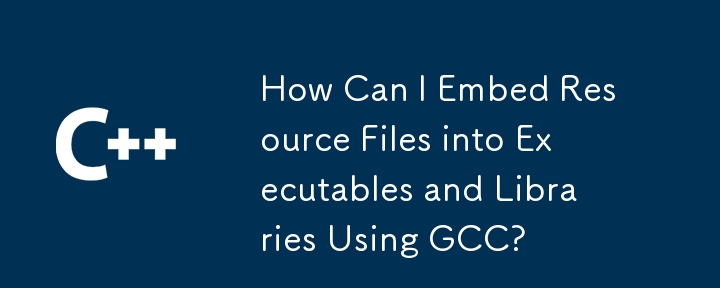 Backend Development
Backend Development
 C++
C++
 How Can I Embed Resource Files into Executables and Libraries Using GCC?
How Can I Embed Resource Files into Executables and Libraries Using GCC?
How Can I Embed Resource Files into Executables and Libraries Using GCC?
Dec 14, 2024 am 01:28 AM
Embedding Resource Files in Executables and Libraries Using GCC
Embracing resource files within executables and shared libraries can enhance security, maintainability, and space efficiency. To accomplish this with GCC, various approaches are available.
Option 1: Linking Using objcopy
objcopy, a utility from GNU binutils, can extract binary data from a file and incorporate it into an executable's data section.
objcopy -B i386 -I binary -O elf32-i386 foo-data.bin foo-data.o
This creates a foo-data.o object file that can be linked into the executable. The corresponding C interface allows access to the data.
Option 2: Inline Assembly via .incbin
Utilizing inline assembly with the .incbin directive enables direct inclusion of binary data within the executable's memory image.
.incbin "foo-data.bin"
This approach provides enhanced control over the data's placement and enhances portability across different platforms.
Loading Embedded Resources
The embedded resources are typically loaded through the C interface generated by objcopy or accessed using pointers directly assigned in the inline assembly code. The data structure of the embedded files is defined in a separate header file.
Advantages of Embedding Resources
Embedd
The above is the detailed content of How Can I Embed Resource Files into Executables and Libraries Using GCC?. For more information, please follow other related articles on the PHP Chinese website!

Hot AI Tools

Undress AI Tool
Undress images for free

Undresser.AI Undress
AI-powered app for creating realistic nude photos

AI Clothes Remover
Online AI tool for removing clothes from photos.

Clothoff.io
AI clothes remover

Video Face Swap
Swap faces in any video effortlessly with our completely free AI face swap tool!

Hot Article

Hot Tools

Notepad++7.3.1
Easy-to-use and free code editor

SublimeText3 Chinese version
Chinese version, very easy to use

Zend Studio 13.0.1
Powerful PHP integrated development environment

Dreamweaver CS6
Visual web development tools

SublimeText3 Mac version
God-level code editing software (SublimeText3)

Hot Topics
 C Polymorphism : is function overloading a kind of polymorphism?
Jun 20, 2025 am 12:05 AM
C Polymorphism : is function overloading a kind of polymorphism?
Jun 20, 2025 am 12:05 AM
Yes, function overloading is a polymorphic form in C, specifically compile-time polymorphism. 1. Function overload allows multiple functions with the same name but different parameter lists. 2. The compiler decides which function to call at compile time based on the provided parameters. 3. Unlike runtime polymorphism, function overloading has no extra overhead at runtime, and is simple to implement but less flexible.
 C Destructors code samples
Jun 13, 2025 am 12:04 AM
C Destructors code samples
Jun 13, 2025 am 12:04 AM
The destructor in C is used to free the resources occupied by the object. 1) They are automatically called at the end of the object's life cycle, such as leaving scope or using delete. 2) Resource management, exception security and performance optimization should be considered during design. 3) Avoid throwing exceptions in the destructor and use RAII mode to ensure resource release. 4) Define a virtual destructor in the base class to ensure that the derived class objects are properly destroyed. 5) Performance optimization can be achieved through object pools or smart pointers. 6) Keep the destructor thread safe and concise, and focus on resource release.
 What Are the Different Kinds of Polymorphism in C ? Explained
Jun 20, 2025 am 12:08 AM
What Are the Different Kinds of Polymorphism in C ? Explained
Jun 20, 2025 am 12:08 AM
C has two main polymorphic types: compile-time polymorphism and run-time polymorphism. 1. Compilation-time polymorphism is implemented through function overloading and templates, providing high efficiency but may lead to code bloating. 2. Runtime polymorphism is implemented through virtual functions and inheritance, providing flexibility but performance overhead.
 How to Implement Polymorphism in C : A Step-by-Step Tutorial
Jun 14, 2025 am 12:02 AM
How to Implement Polymorphism in C : A Step-by-Step Tutorial
Jun 14, 2025 am 12:02 AM
Implementing polymorphism in C can be achieved through the following steps: 1) use inheritance and virtual functions, 2) define a base class containing virtual functions, 3) rewrite these virtual functions by derived classes, and 4) call these functions using base class pointers or references. Polymorphism allows different types of objects to be treated as objects of the same basis type, thereby improving code flexibility and maintainability.
 C : Is Polymorphism really useful?
Jun 20, 2025 am 12:01 AM
C : Is Polymorphism really useful?
Jun 20, 2025 am 12:01 AM
Yes, polymorphisms in C are very useful. 1) It provides flexibility to allow easy addition of new types; 2) promotes code reuse and reduces duplication; 3) simplifies maintenance, making the code easier to expand and adapt to changes. Despite performance and memory management challenges, its advantages are particularly significant in complex systems.
 C Destructors: Common Errors
Jun 20, 2025 am 12:12 AM
C Destructors: Common Errors
Jun 20, 2025 am 12:12 AM
C destructorscanleadtoseveralcommonerrors.Toavoidthem:1)Preventdoubledeletionbysettingpointerstonullptrorusingsmartpointers.2)Handleexceptionsindestructorsbycatchingandloggingthem.3)Usevirtualdestructorsinbaseclassesforproperpolymorphicdestruction.4
 Polymorphism in C : A Comprehensive Guide with Examples
Jun 21, 2025 am 12:11 AM
Polymorphism in C : A Comprehensive Guide with Examples
Jun 21, 2025 am 12:11 AM
Polymorphisms in C are divided into runtime polymorphisms and compile-time polymorphisms. 1. Runtime polymorphism is implemented through virtual functions, allowing the correct method to be called dynamically at runtime. 2. Compilation-time polymorphism is implemented through function overloading and templates, providing higher performance and flexibility.
 What Are the Various Forms of Polymorphism in C ?
Jun 20, 2025 am 12:21 AM
What Are the Various Forms of Polymorphism in C ?
Jun 20, 2025 am 12:21 AM
C polymorphismincludescompile-time,runtime,andtemplatepolymorphism.1)Compile-timepolymorphismusesfunctionandoperatoroverloadingforefficiency.2)Runtimepolymorphismemploysvirtualfunctionsforflexibility.3)Templatepolymorphismenablesgenericprogrammingfo





